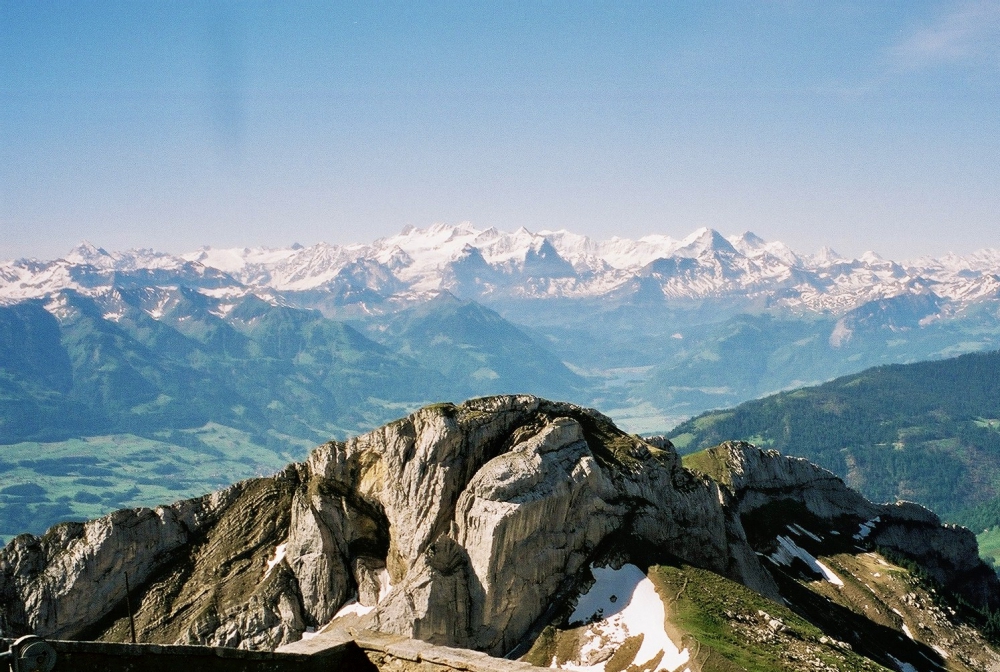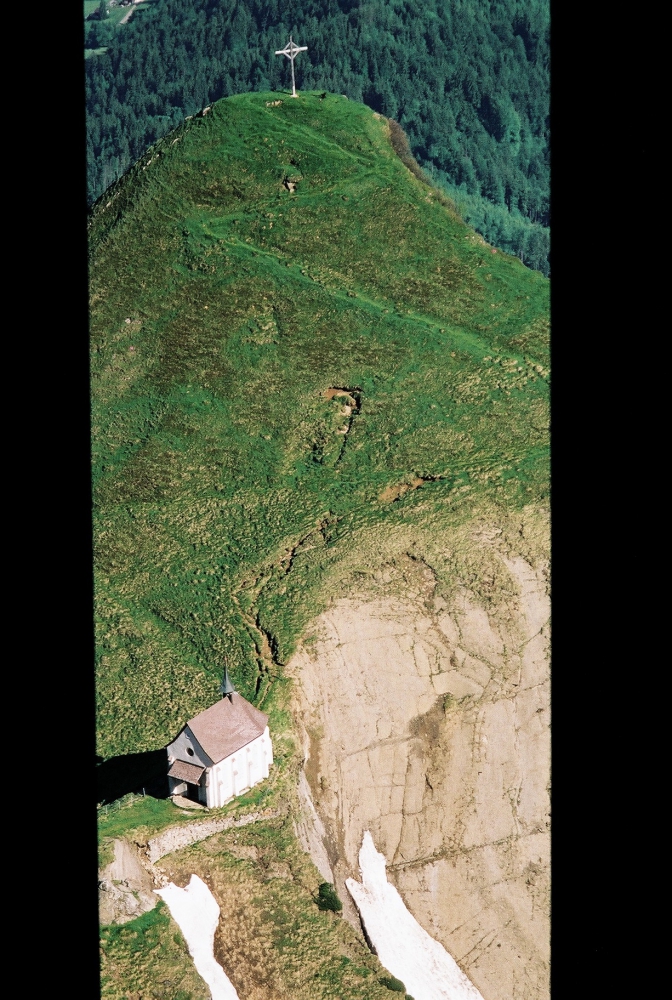
Blogs
Connecting Two Pictures
Wednesday, December 18, 2024 by Phyllis Smith Kester
 Groups of random photographic memories decorate my walls and sometimes evoke requests for the stories behind them. However, two suddenly became my focus when a visitor burst into tears after her first glance.
Groups of random photographic memories decorate my walls and sometimes evoke requests for the stories behind them. However, two suddenly became my focus when a visitor burst into tears after her first glance.
The first picture was taken in 2000 when Monty and I were in Lucern, Switzerland. We took an aerial cable car to Mount Pilatus, a famous mountain in Switzerland with fabulous hiking trails and a stunning panoramic view of the rolling peaks and valleys with crystal clear lakes and lush green meadows scattered among the 73 Alpine peaks. During our breathtaking hike around the top, we noticed an incredible chapel sitting on a dramatic cliff edge overlooking Lake Lucerne and the surrounding mountains. This small chapel, Klimsenkapelle, was located over 6,000 feet above sea level and appeared to be on the edge of what might have been where a landslide originated in some distant past. In my imagination, I assumed the remote chapel must have been built in memory of lives lost in that imagined ancient landslide. Then, I noticed a cross erected further up the mountain from the chapel, out on the peak.

Later, I learned the chapel is located on the Klimsenhorn summit, another mountain peak in the Pilates massif we had been on. The chapel was completed in 1861 as part of entrepreneur Kaspar Blattler’s Hotel Klimsenhorn. The hotel was demolished in 1967, but the chapel remained. Thanks to conservation measures, in 2002, it became a listed historical monument that attracts many tourists who hike the well-marked paths to admire the neo-Gothic chapel with highly distinct architecture and breathtaking views.
The second picture occurred seven years later when we joined a dozen people visiting sites in Jordon significant to Christian, Jewish, and Islamic faiths. We visited Mount Nebo, one of Jordan’s most important Holy Sites. According to scripture and historians, it is where Moses (or Prophet Musa in the Quran) is believed to have stood to see the Promised Land before his death. (The term ‘the Promised Land’ is sometimes viewed as synonymous with Israel and is a homeland for the Jewish people. God promised it to Abraham and his descendants, and Moses was about a sixth-generation grandson. Genesis 12:1-3; 15:18-21; Deuteronomy 34:1-4)
Early Christians from Jerusalem made Mount Nebo a place of pilgrimage. In the 3rd or 4th century, monks from Egypt built a small church on one of its peaks—possibly on the site of an even older structure. It was to commemorate the life and death of the man regarded as a prophet by all three Abrahamic religions (Judaism, Christianity, and Islam). In the intervening years, much has changed, been reconstructed, and redeveloped at this site, but Mount Nebo’s religious and historical significance remains.
It felt profound for me to stand on this rock outcrop towering above the desert and dry farmlands below and realize this was the same area where one of the Old Testament’s most important figures once stood. Here, on the east side of the Jordan River and opposite Jericho, I could see the panorama Moses viewed: the Dead Sea, the Jordan River valley, Jericho, Bethlehem, and even the distant mountains of Jerusalem, such as the Mt. of Olives.
A modern sculpture on top of Mount Nebo has become so popular that it has become the site's symbol. It serves as a reminder of the significant biblical passage in Numbers 21:4-9 regarding an incident during the 40-year exodus journey of the rebellious Israelites. They grew tired and frustrated on their journey through the desert and spoke against God and Moses. According to the narration, God sent poisonous snakes among them as punishment. Many were bitten and died. The people repented and asked Moses to pray to God regarding their situation. God told Moses to make a bronze snake and place it high on a pole. All who were bitten and looked up at the raised serpent survived the plague because all who looked at it were miraculously healed and saved from certain death.
Italian artist Giovanni Fantoni created the twisting form of the Brazen Serpent sculpture. It imaginatively merged two ideas: the life-saving bronze serpent set up by Moses in the desert while its placement on a cross-like staff evokes the Christian belief in salvation through the crucifixion of Jesus.
This sculpture illustrating God’s mercy was the primary picture my friend focused on. So, why did she get so excited and tear up upon seeing my two photos?
While standing at my front door, she spied my picture of the Brazen Serpent sculpture on the wall and rushed to it. Bouncing with animation and expressive Italian hand gestures, she began describing what it meant to her once she understood how Moses lifted up the snake in the wilderness and how God healed everyone who turned and believed that He would heal them from the certain death caused by the poisonous snakes.
Her words tumbled forth, mixed with tears, as she explained how astounded she was that the only thing the children of Israel had to do was believe, and they were saved from certain death. They had nothing physical like medication or ritual to use. She erupted with glee over the significance to her once she realized this Old Testament situation was a picture showing her how she could be saved and have eternal life by faith in Jesus. She had been trying to make it more complicated and had totally missed the simplicity.
With much hand waving, she described how her mind exploded with joy when she realized how she, along with everyone, was condemned just as those Children of Israel were when the poisonous snakes started biting them—yet God provided a way for their escape from death from the snake bites just as he had provided Jesus as a way for her escape. She pointed to the empty cross in the second picture. “That shows the trustworthiness of God, for it shows God’s promise kept.”
“Phyllis,” she added. “I was bitten by sin and realized it was a mortal wound, but God had provided a way for me, too.” With tears in her eyes, she suddenly grabbed me in a hug while still bouncing with excitement. “Oh, Phyllis, I can’t believe it’s right there on your wall! That Old Testament picture showed what would happen in the New Testament when Jesus came and was crucified for us. Thank you! Thank you for reminding me of the sweet blessing through your pictures!”
Today, years later, I confess that no one else has ever reacted with such animation to any of my snapshots. To say I was surprised is putting it mildly.
These two pictures continue to remind me of a promise made by God in the desert to struggling people and His trustworthiness in keeping not only his promise to them then but also how, after 400 years of silence since the last prophecy about the coming of Messiah, God kept another promise with the birth of Jesus. And the empty cross reminds me how some really big things may start seemingly insignificant and small. After all, God once used a baby in a stable to bring change to the world! So I stake my faith in His Words, and faith displaces fear. For now, I see much more clearly that God, in His love and mercy, wants to save! His passion is to redeem, not destroy.
______________
Jesus pointed out, “Just as Moses lifted up the snake in the wilderness so the Son of Man must be lifted up, that everyone who believes may have eternal life in him.”
For God so loved the world that he gave his one and only Son, that whoever believes in him shall not perish but have eternal life. For God did not send his Son into the world to condemn the world, but to save the world through him. Whoever believes in him is not condemned, but whoever does not believe stands condemned already because they have not believed in the name of God’s one and only Son. John 3:14-18 (NIV)
Whoever believes in the Son has eternal life, but whoever rejects the Son will not see life, for God’s wrath remains on them. John 3:36 (NIV)
Comments
Peggy Holcomb From Fort Worth, Texas At 4/10/2025 10:53:55 AM
I really enjoyed your bookReply by: Phyllis
Thank you, Peggy.Linda Evans From Lynchburg, Va At 12/19/2024 9:25:42 AM
The most wonderful gift ever given! How blessed are we, and we only need to believe and follow his words of guidance.Reply by: Phyllis
We are indeed blessed by His love and mercy.Previous Posts
Tornado Alley
Phyllis Smith Kester
5/5/2025
Geodes--Part 2
Phyllis Smith Kester
4/23/2025
1940s in Oklahoma
Phyllis Smith Kester
4/8/2025
Buel Overcomes Adversity
Phyllis Smith Kester
3/24/2025
Buel Smith & Pitchers
Phyllis Smith Kester
3/11/2025
Remembering Grandpa Smith
Phyllis Smith Kester
2/26/2025
Meeting Corrie ten Boon
Phyllis Smith Kester
2/10/2025
Walking the Plank
Phyllis Smith Kester
1/28/2025
Train Ride in a Flood
Phyllis Smith Kester
1/13/2025
Saltillo Surprises
Phyllis Smith Kester
1/1/2025
Connecting Two Pictures
Phyllis Smith Kester
12/18/2024
Kintsugi Brokenness & Beauty
Phyllis Smith Kester
12/3/2024
Capillary Action
Phyllis Smith Kester
11/20/2024
A Forge and Anvil
Phyllis Smith Kester
11/5/2024
Tree Analogy #5-Bloom
Phyllis Smith Kester
10/24/2024
Tree Analogy #4: Brokenness
Phyllis Smith Kester
10/9/2024
Israel and Golan Heights
Phyllis Smith Kester
9/25/2024
Tree Analogy #3: Bent Tree
Phyllis Smith Kester
9/11/2024
Lesson From NASA
Phyllis Smith Kester
8/27/2024
Storm Warning
Phyllis Smith Kester
8/14/2024
Tree Analogy #2: Hanging Sod
Phyllis Smith Kester
7/31/2024
Tree Analogy #1: Angel Oak
Phyllis Smith Kester
7/17/2024
The Warning Shot
Phyllis Smith Kester
7/2/2024
Trip's Delayed Surprise
Phyllis Smith Kester
6/18/2024
Antelope Slot Canyon
Phyllis Smith Kester
6/4/2024
The Pioneer Woman
Phyllis Smith Kester
5/21/2024
What is a Woman, a Wife, or a Mother?
Phyllis Smith Kester
5/8/2024
Two Analogies
Phyllis Smith Kester
4/24/2024
Solar Eclipse Analogy
Phyllis Smith Kester
4/10/2024
EASTER
Phyllis Kester
3/26/2024
The Resurrection Plant
Phyllis Smith Kester
3/12/2024
Busted on Pikes Peak
Phyllis Smith Kester
2/27/2024
What is Love?
Phyllis Smith Kester
2/13/2024
Looking, But Not Seeing
Phyllis Kester
1/30/2024
Remembering Christmas 2023
Phyllis Kester
1/16/2024
The Potter
Phyllis Kester
1/2/2024
The Tree Ornament
Phyllis Kester
12/19/2023
Cockapoo Kristy
Phyllis Kester
12/6/2023
Surprises & Obsessions
Phyllis Kester
11/21/2023
Breaking Thru
Phyllis Kester
11/7/2023
Eagles
Phyllis Kester
10/24/2023
Facing Fear
Phyllis Kester
10/10/2023
The Bug-Eyed Monster
Phyllis Kester
9/25/2023
The Flash Flood
Phyllis Kester
9/12/2023
David's Library Book
Phyllis Kester
8/29/2023
Object Lesson: The Leaky Bucket
Phyllis Kester
8/16/2023
Turpentine Creek
Phyllis Kester
8/1/2023
The Surprise
Phyllis Kester
7/17/2023
Small Pleasures
Phyllis Kester
7/4/2023
Are Fathers Important?
Phyllis Kester
6/20/2023
Fathers and Father's Day
Phyllis Smith Kester
6/6/2023
Legacies of my mother, Hallie Hays Smith
Phyllis Smith Kester
5/23/2023
Hallie's Handkerchief Holder
Phyllis Kester
5/9/2023
A Voice from the Past
Phyllis Kester
4/25/2023
Object Lesson: The Crystal Paperweight
Phyllis Kester
4/11/2023
Grandma’s Quilting Bee
Phyllis Kester
3/28/2023
Actions have Consequences
Phyllis Kester
3/14/2023
Hungry Baby
Phyllis Kester
2/28/2023
Married to a Texan
Phyllis Kester
2/14/2023
Charley Kester’s Horses
Phyllis Kester
1/31/2023
Persistence In The Dirt
Phyllis Kester
1/17/2023
Object Lesson: Mushrooms in Our Life
Phyllis Kester
1/3/2023
Trip with Unexpected Twists
Phyllis Kester
12/20/2022
Grandma’s Important Legacy
Phyllis Kester
12/6/2022

